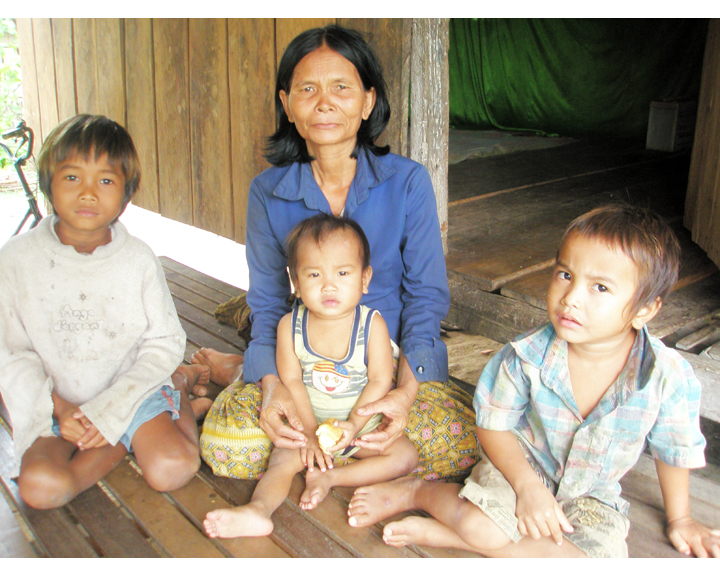

A safety net for Cambodia’s malnourished children

A safety net for Cambodia’s malnourished children
By Eamonn Casey
Frail, lethargic and desperately malnourished at the age of nine months, to the smiling, healthy boy he is today, Sok Chea is a success story for his local health clinic, his community and the UN joint programme tackling malnutrition in Cambodia’s Kampong Speu province.
“Before he was so skinny, but now you see he’s fat,” says Chou Savang of her grandson, now a chubby and bright-eyed 16-month-old. “If you have food to give him, he is happy to eat it: rice soup, egg, porridge, bread or whatever I can afford to give him. Now, you see, he can stand: last year he could only lie down, almost lifeless, and do nothing.”
Having suffered frequent respiratory infections, bouts of diarrhoea and fevers as an infant, Chea was barely clinging to life by five months. Listless and uninterested in eating, he frightened workers at the local health centre, who initially refused to admit him for fear that he would die in their care.
But in October 2010, volunteers trained by an MDG-Fund-supported programme referred Sok Chea for treatment after conducting a community screening which found more than 150 children in his village suffering from malnutrition.
The Joint Programme for Children, Food Security and Nutrition, implemented by UN agencies and the Cambodian government, is aimed at improving the nutritional status of children aged 0-24 months, as well as pregnant and lactating women. It focuses on promoting early and exclusive breastfeeding, adequate complementary feeding and improved maternal nutrition.
The programme particularly targets high-risk populations, with a comprehensive package of interventions to combat under-nutrition and increase food security. It’s part of the MDG-Fund’s mission to help countries like Cambodia reach the Millennium Development Goals of reducing poverty and improving livelihoods, especially for the most deprived and marginalized communities – people like Chea and his family.
Life dealt Chea a tough start. His mother refused to breastfeed him, as she had his older brother, after hearing stories that breastfeeding causes women to lose their beauty. She abandoned the family when Chea was one month old; deprived of the right nutritional start, Chea was effectively ill from birth and received countless treatments for various ailments. The boys’ father, a truck driver, gets home only once a month, so their care has fallen to their grandmother.
By the time Chea was brought to the Toul Sala health centre in the southwestern province of Kampong Speu, he weighed 5.5kg, about half the normal weight for his age. He was diagnosed with severe acute malnutrition and put immediately on a high-nutrition therapeutic food mix. Chea quickly gained weight and within four months had moved out of the malnourished category, looking “fresher, fatter and more active,” according to one health worker.
The health center’s chief, nurse Ek Sarun, said Chou Savang’s diligence in following food preparation and hygiene instructions, and the effort she made to attend regular check-ups, was crucial to her grandson’s recovery. “Chea is one of the success stories – for the health centre, and the community as well.”
Five months after his treatment finished, Chea is thriving. “Now we can play with him,” says his 10-year-old uncle, Sok Raksa, who takes care of Chea when his grandmother works in the rice fields. “He looks fatter, and I’m happy he’s stopped being sick.”
Chou Savang has quiet ambitions for Chea and his brother: that they’ll grow up to be healthy and good, with happier marriages than she and her son managed; that they’ll get some education, and perhaps work as truck drivers, like their father, or even as teachers. That Chea has a future to shape and dream about means a lot to the family.
“I am really thankful for the health staff and the products that helped my grandson survive,” says Chou Savang. “Otherwise, he would have already died.”
********************************************************************************************************
The Joint Programme for Children, Food Security and Nutrition is a collaboration between the Cambodian government and six UN agencies – the WFP, WHO, FAO, UNICEF, UNESCO and ILO.
To date, it has established programmes to manage acute malnutrition in five health centers in Kampong Speu province, and is assisting in the development of a nation-wide behavior change communications plan to promote early and exclusive breast-feeding, complementary feeding and better maternal nutrition. It has also established a food security and nutrition monitoring system, and supported the development and review of several national maternal and child nutrition policies.
Click here to read about the MDG-Fund's work in Cambodia.
Click here to read other success stories from the MDG-F's work to fight poverty and improve livelihoods around the world.